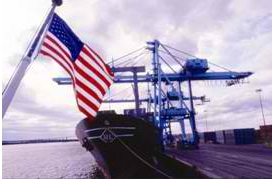Sea Star ramps up service amid growing local concern


From left: Puerto Rico Trade and Export Executive Director Francisco Chévere, Marcelino Borges, director of field operations of the Bureau of Customs and Border Protection, Pierluisi, and Paul “Chip” Jaenichen, administrator of the U.S. Maritime Administration during Monday’s roundtable.
Maritime cargo operator Sea Star Line, LLC announced Monday it has entered an agreement to on-hire another barge to add to its current service package for shipments from Jacksonville to Puerto Rico, which responds to escalating concerns from government and private sector components over the lack of goods in the last few weeks.
The new barge has the capacity for 320 dry units and its initial departure is scheduled for the first week of April, Sea Star said. In January, Sea Star Line added two barges to address increased demand in the market, and to do its part to fill the void left by Horizon Lines, upon its exit from the market in January.
The total capacity for Sea Star’s barges is 750 FEUs with dedicated space for 84 refrigerated containers, the company said.
Thus far in 2015, Sea Star Line has on-hired or purchased more than 2,300 pieces of equipment, including dry and refrigerated containers, chassis and gensets. The additional fleet now gives Sea Star Line the ability to accommodate over 520 refrigerated containers weekly. Other operational upgrades include extended gate hours, expedited vessel transit times and additional labor to process equipment, the company said.
In October, Sea Star Line will deploy the first of two Marlin class vessels with a capacity of 3100 TEUs. Each vessel will accommodate 268 refrigerated containers with expansion capabilities to handle up to 350 refrigerated containers.
The new vessels will be the world’s first liquefied natural gas (LNG) powered containerships and dedicated solely to the Puerto Rico trade.
“We recognize the void left by the departure of Horizon Lines and it is Sea Star’s goal to support the demands of the Puerto Rico market,” said Tim Nolan, president of Sea Star Line. “We’re confident the additional barge capacity and new Marlin Class vessels will support both the immediate and long term shipping requirements for the island.”
Pierluisi heads forum to discuss Jones Act issue
Sea Star’s announcement coincided with a forum held Monday by Resident Commissioner Pedro Pierluisi, to discuss with government representatives and members of the private sector the impact Horizon Lines’ departure from the Puerto Rico shipping market.
The roundtable, which involved federal agencies, shipping companies, commercial organizations and government representatives from Puerto Rico, aimed to determine whether products are being held at U.S. ports, and the process for requesting a waiver from Jones Act, or cabotage laws, stipulations.
“Since I came to Congress in 2009, I have tried to ensure that my constituents have all the relevant information about the Jones Act, and that political leaders in the federal capital have all the data on the effects of this law on Puerto Rico, whether positive or negative. The Jones Act impacts virtually every sector of our economy,” Pierluisi said.
The Jones Act requires that all transportation of marine cargo between U.S. ports be carried in ships built in the United States, are American owned and operated by an American crew. This law applies throughout the territory under the jurisdiction of U.S. Customs, which includes Puerto Rico.
“Horizon was an important part of our maritime market, as it transported products weekly between Puerto Rico and Elizabeth in New Jersey, Florida and Jacksonville, and Houston, Texas. According to numbers from 2011, Horizon Lines commanded about 30 percent of the island’s maritime cargo market and drove 38 percent of the total shipping capacity authorized by the Jones Act in Puerto Rico,” Pierluisi said.
“Therefore, it is reasonable that my constituents have questions and concerns about whether shippers authorized by the Jones Act that remain will be able to fill the void left by Horizon’s departure,” he said.
Horizon’s departure left Puerto Rico with transportation of goods only from the New Jersey port. However, in recent weeks, competitors Sea Star and Crowley have announced new services from Jacksonville — a key port for product movement to the island.
The roundtable included participation by the island’s main trade groups, including the Puerto Rico Manufacturers Association, the United Retailers Association, the Puerto Rico Chamber of Commerce, the Puerto Rico Marketing, Industry and Food Distribution Chamber (MIDA for its Spanish acronym), Sea Star, Crowley, National Shipping of America and Trailer Bridge.
The PRMA, represented by Tom Vincent, head of the group’s transportation committee, brought up the problems members are having regarding movement of cargo.
“Some companies have had to send their cargo by air, which represents an increase in operating costs,” he said, citing as examples companies like Harvey Hubble in Vega Baja and Becton Dickinson in Caguas.
Horizon Lines’ departure “generated a problem of logistics and coordination,” he said, acknowleding the work of the remaining companies to adjust and fill the void.
“Therefore, it is not feasible to request a waiver of the Jones Act since the problem can be solved in the short term with the movements shipping companies are making, and it can not be defined as a national emergency,” he said.





